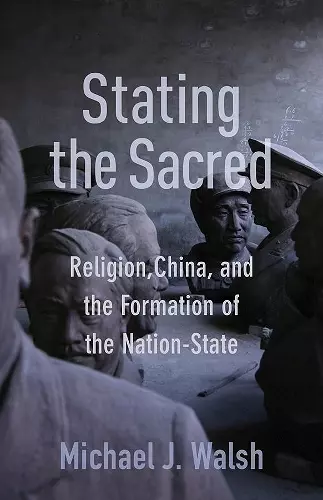Stating the Sacred
Religion, China, and the Formation of the Nation-State
Format:Paperback
Publisher:Columbia University Press
Published:17th Mar '20
Should be back in stock very soon

China’s constitution explicitly refers to its sovereign domain as “sacred territory.” Why does an avowedly secular state make such a claim, and what does this suggest about the relations between religion and the nation-state? Focusing primarily on China, Stating the Sacred offers a novel approach to nation-state formation, arguing that its most critical element is how the state sacralizes the nation.
Michael J. Walsh explores the religious and political dimensions of Chinese state ideology, making the case that the sacred is a constitutive part of modern China. He examines the structural connection among texts (constitutions, legal codes, national histories), ostensibly universal and normative categories (race, religion, citizenship, freedom, human rights), and territoriality (the integrity of sovereignty and control over resources and people), showing how they are bound together by the sacred. Considering a variety of what he refers to as theopolitical techniques, Walsh argues that nation-states undertake sacralization in order to legitimate the violence of establishing and expanding their sovereignty. Ultimately, territorialization is a form of sacralization, and the foundational role of the sacred makes all nation-states religious states. Stating the Sacred offers new ways of understanding China’s approach to legality, control of the populace, religious freedom, human rights, and the structuring of international relations, and it raises existential questions about the fundamental nature of the nation-state.
As an anatomy of sacralization, territorialization, and violence, Stating the Sacred illuminates state formation in China through brilliant exposition, dwelling in vivid details, historical depths, and current controversies, but also through uncovering brutal truths of state formation in the modern world. This book is a major contribution to our understanding of how the sacred works in the modern and how the modern works the sacred. -- David Chidester, author of Empire of Religion: Imperialism and Comparative Religion
In Stating the Sacred, Michael J. Walsh parses what China's postcoloniality and South African apartheid have in common: the sacredness of violence. Drawing upon a wealth of theoretical insight from Schmidt on political theology, Bataille on sacrifice, to Agamban on profanation, and Barthes on myth, Walsh is especially insightful on how the Chinese avowedly atheist party-state adroitly rules through its stringent and energetic containment of religion, channeling those energies into policies on territorial sovereignty and citizenship itself. These tactics range beyond patriotic Christian organizations and registering all the clergy everywhere, to policing reincarnation among the Tibetan Buddhist and reeducation of Uyghur Muslims in camps. For Walsh, this sense of 'religion,' shared by China with many other places, becomes the modern repository of violence and mythos that he finds fundamental to any nation-state formation. -- Angela Zito, coeditor of DV-Made China: Digital Subjects and Social Transformations after Independent Film
Recommended. * Choice *
[A] brilliant analysis of contemporary China. * Reading Religion *
This is an innovative study that gives particular consideration to the role of the sacred in the formation of the PRC state, and to nation-states more generally. * Journal of Church and the State *
ISBN: 9780231193573
Dimensions: unknown
Weight: unknown
272 pages